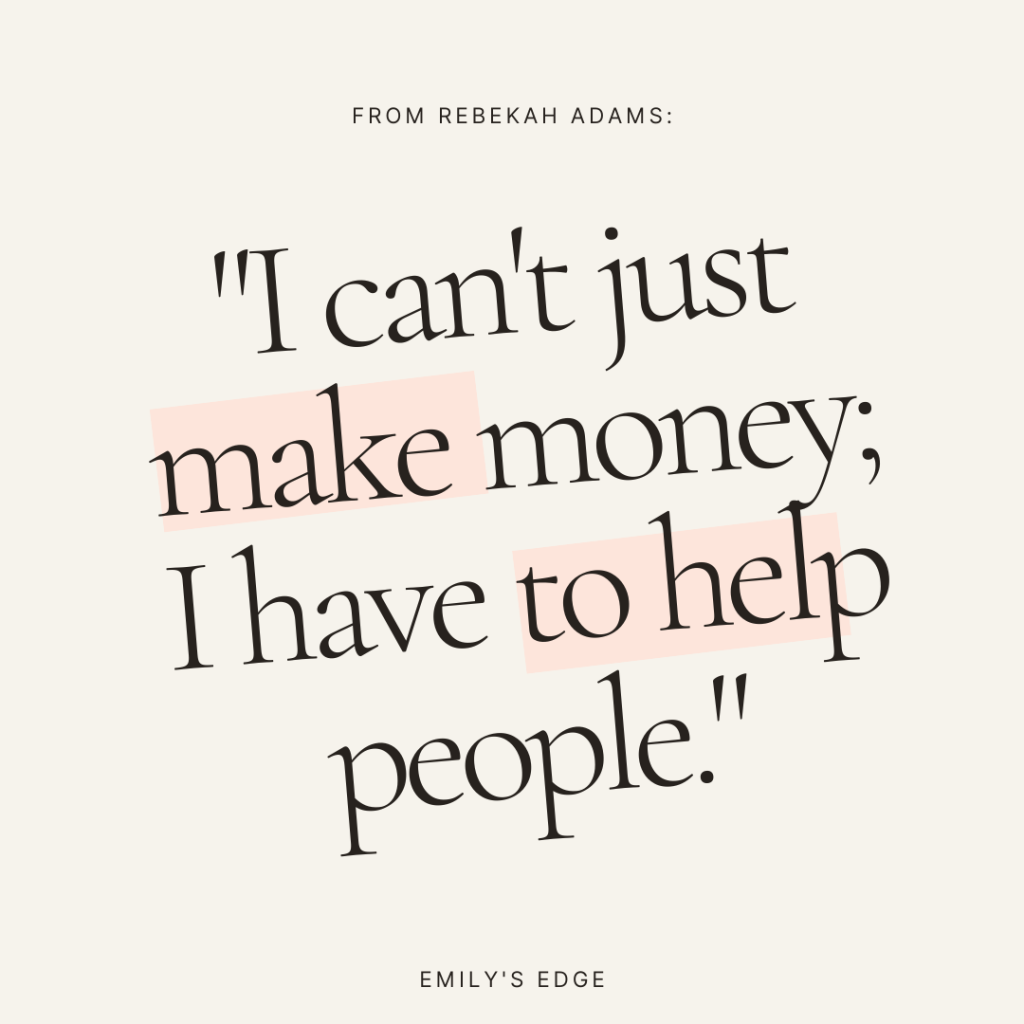
Hi everyone,
For my post on fast fashion today, I am sharing an interview I had with the founder and designer behind Poppyseed Clothing, Rebekah Adams. She has been working on Poppyseed since 2016 and has many achievements, including winning Bellevue Collection’s Independent Designer Runway Show. Adams’ pieces are created using sustainable and ethically sourced materials, and we were able to have a really great conversation about fast fashion and sustainability together. I hope you enjoy the interview!
Emily: So, to get started, I want to know how you got started on Poppyseed, where the idea came from, everything like that.
Rebekah Adams: I started it because I was pregnant with my son and needed maternity clothes, and every time I walked into a maternity store, I felt like not myself. I didn’t want to wear super cute, girly maternity clothes because that’s just not the kind of person I am. When I got pregnant, I wanted to start a company based off of [a maternity dress I made for my sister in college], with the concept of giving women clothing that, yes, can be worn while you’re pregnant but that is not “maternity” and that doesn’t look like an eight year old girl. Then, I started Poppyseed and we produced three different full collections and a couple smaller ones over the six years I was there. I did a Bellevue Collection runway show, which we won, and then sold clothing in boutiques around the Pacific Northwest, and it was a great, great time.
E: Was having clothing that was timeless and sustainable always important for you?
RA: It first sparked when I was a sophomore in college, we watched a documentary called China Blue, and it was about making jeans in China, and it shook me. I went into fashion thinking oh, it will be so fun, and my teacher was so passionate, and opened up my eyes. I was like, alright, my whole mindset changed. I have to work for a sustainable, ethically sourced company. I can’t just make money, I have to also help people, and so the whole ethos of what I wanted to do with my career changed after that. For Poppyseed, we used a lot of deadstock fabric, and if we had leftover product we would change it and sell it again after we redesigned it. When I was a sophomore in college, I was definitely a hypocrite because I still bought stuff from TJ Maxx, and I was like well, I’m informed, but I didn’t do it with my purchasing power. I would buy cheap clothing, and then it would hit me, I’m not doing what I believe and I’m not buying this anymore. I need to know where it comes from and it needs to be locally made or thrifted.
E: What are recommendations that you have for someone who wants to shop ethically and sustainably and break out of the fast fashion cycle?
RA: I love this app called Good On You, and you can type in any brand and it will give you a rating. There’s also The Sustainable Fashion Forum, and it’s a great place to look. Becoming armed with information is really important, and having an understanding of how garments are made is important because there’s times where we walk into, let’s say Target, and we see a sweatshirt for $5.99 and buy it. Not a lot of people realize that there was a person who made that. I think, when you go in, and you see each piece of clothing, you can see each person. If I buy that, I’m going to support something that I don’t really believe in. But if I use my purchasing power to buy even one sweatshirt, but it supports a woman who is in a clean factory and she’s safe and getting paid a living wage, her life is going to be better and it’s going to show that company that you support what they’re doing. So, I think you need to educate yourself, and it’s a hard thing to do.
E: A lot of people talk about how fast fashion is convenient because it’s low priced and you can get whatever is trendy. What would you say in response to that?
RA: Just because something is convenient doesn’t mean it is good for you. Of course it’s convenient; giving into what’s easy is when you have to build up resistance and say no. The more interesting thing is, do you want to live an easy and convenient life? Or do you want to build something that’s important and going to last?
E: Is there anything else you’d like for consumers to know about supporting small and local businesses?
RA: Buying local is awesome, but also I feel like people get put off from the price. There’s so much more that you can do, like posting on socials or building up the owner. Behind every shop is a shop owner’s dream and livelihood tied to it, and they deserve our support because they’re stepping out and doing this really hard thing. So, try to shop local, and after that, do ethically made and ethically sourced items.
Thank you so much to Rebekah Adams for the wonderful interview. She was amazing to talk to and had great insight when it came to fashion and sustainability. I hope you all enjoyed. See you soon.
-Emily Berrol










